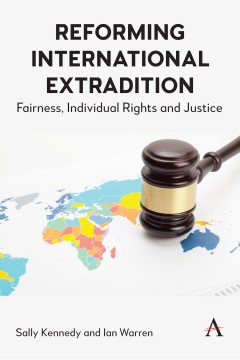Reforming International Extradition
Fairness, Individual Rights and Justice
By Sally Kennedy & Ian Warren
Other Formats Available:
- About This Book
- Reviews
- Author Information
- Series
- Table of Contents
- Links
- Podcasts
About This Book
This book explores possible reforms to improve the operation of the international extradition process. The book commences by outlining why international extradition requires reform based on its current operation. Whilst extradition is important for enabling transnational criminal justice and policing cooperation, its implementation is fraught with political problems, time delays, and issues that result from outdated legal and jurisdictional geographies. This is because extradition is enforced at the domestic level, rather than through genuine transnational legal processes. Domestic legal and political issues can create conflict between the nations involved and compromise the human rights of individual extraditees.
This book discusses these issues alongside the significance of globalisation, the dominance of territorial sovereignty in determining criminal jurisdiction, and the delicate balance between state rights, international cooperation, and individual protections, which are associated with extradition processes. This range of issues demonstrates how the normative assumptions behind extradition ensure these processes are likely to prioritise the interests of comity between nation states, rather than the rights of individuals. The limited availability of judicial relief for extraditees reflects how state rights are prioritised, with the law implementing high thresholds needed to establish proof human rights violations will occur if a person is surrendered. Further technical issues, such as the rule of non-inquiry, restrictive evidence options, and judicial deference to the executive, also compromise fairness in extradition cases. This combination of issues are the driving force behind the book’s argument regarding the need for global reform of the extradition process.
The book uses several case studies to demonstrate these key problems. These include the high-profile cases involving Julian Assange and Kim Dotcom, as well as lesser-known cases involving Hassan Diab, Daniel Snedden, Dorin Savu, and Elias Perez. These examples span multiple jurisdictions and highlight the common problem that judicial decision-making prioritises international comity by favouring surrender of the extraditee over individual elements, such as mental health and a high risk of suicide if surrender is ordered. These examples also illustrate how questions of governmental overreach, the role of transnational digital communication systems in the commission of offshore offences, and the operation of complex rules of evidence, can lead to prejudicial trials, as well as broader problems with the extradition process that undermine procedural fairness, refugee rights, and other potential violations of international human rights reqirements. This combination of factors provides an important opportunity to reform extradition law and procedure.
The book argues that developing a defendant-centred approach is the overarching lens for examining extradition reform to prioritise fairness as a core value for promoting global justice. This includes introducing a more harmonised approach for transnational justice administration that contains clear protections for individuals by limiting established extradition rules. The book argues, for example, against the application of the rule of non-inquiry to enable greater post-extradition monitoring of people who are surrendered, while widening the capacity for extraditees to submit evidence to support a claim against surrender. Reform can also involve the development of new and more viable alternatives to the physical transfer of the extraditee, such as transferring evidence to shift a subsequent criminal trial to the location where most of the alleged offending activity occurred, and sentencing in the extraditee’s home jurisdiction. These reform proposals intentionally challenge the established assumptions of extradition and adjust the unequal levels of authority that favour the power of the state over the rights of the individual.
Reviews
“A welcome addition to the literature, Kennedy and Warren’s book uses case studies to cogently support the reform of extradition in order to counteract egregious foreign criminal prosecutions and protect individual rights and justice.” —Paul Arnell, University Aberdeen, UK.
“Sally Kennedy and Ian Warren provide a brilliant in-depth critical analysis of the current global state of international extradition, challenging the normative assumptions of extradition law, and offering a radical calling for a defendant-centred approach that reprioritises human rights and due process protections for extraditees. This is a gem of a resource for policy reformation that can transform current extradition processes to achieve fairness and justice.” —Dawn L. Rothe, Professor, School of Criminology and Criminal Justice, Florida Atlantic University, USA.
This is a work of great originality. Based on the premise that the current state of extradition law is not suited for the modern reality of globalisation the authors explore with faultless clarity the potential for reform. A book of great interest to academics, criminal justice practitioners, lawand policy-makers. —Saskia Hufnagel, Reader in Criminal Law, School of Law, Queen Mary University of London, UK.
Author Information
Dr Sally Kennedy is a Lecturer in Criminology, specialising in transnational justice administration, including extradition, territorial sovereignty, legal geographies and individual rights.
Dr Ian Warren is Senior Lecturer in Criminology, specialising in transnational criminal law and procedure, as well as several other areas involving crime and law.
Series
Anthem Studies in Law Reform
Table of Contents
Introduction; Chapter One: Extradition and individual rights; Chapter Two: Extradition in practice: The welfare of extraditees; Chapter Three: Extradition in practice: The conduct of nations; Chapter Four: Key reforms; Chapter Five: Conclusion; References; Index
Links
Stay Updated
Information
Latest Tweets



